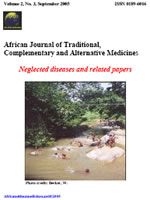
|
African Journal of Traditional, Complementary and Alternative Medicines
African Ethnomedicines Network
ISSN: 0189-6016
Vol. 15, No. 2, 2018, pp. 1
|
 Bioline Code: tc18023
Bioline Code: tc18023
Full paper language: English
Document type: Research Article
Document available free of charge
|
|
|
African Journal of Traditional, Complementary and Alternative Medicines, Vol. 15, No. 2, 2018, pp. 1
| en |
CAN OCIMUM BASILICUM  (BASIL) RELIEF THE IMPACT OF CHRONIC UNPREDICTABLE MILD STRESS ON THE MICE SALIVARY GLANDS? (BASIL) RELIEF THE IMPACT OF CHRONIC UNPREDICTABLE MILD STRESS ON THE MICE SALIVARY GLANDS?
Ayuob, Nasra Naeim; Ali, Soad Shaker & Abd El Wahab, Manal Galal
Abstract
Background: Salivary glands are affected in acute and chronic stressful conditions. Ocimum basilicum (OB), basil, possesses anxiolytic and antidepressant like effect so this study aimed to evaluate the effect of the chronic unpredictable mild stress (CUMS) on the structure of salivary glands of mice and the efficacy of OB in relieving this effect.
Material and Methods: Forty male mice were distributed equally into four groups; the control, CUMS (exposed to the CUMS for 4 weeks), CUMS+Fluoxetine (treated with Fluoxetine after exposure to CUMS), CUMS+OB (treated with OB after exposure to CUMS). Treatments continued for 2 weeks. Behavioral changes and serum corticosterone level were assessed at the end of the experiment. Submandibular and parotid glands were histopathologically examined and stained with anti-alpha smooth muscle actin (ASMA) and anti-brain derived neurotropic factor (BDNF) antibodies.
Results: A depressive behavior was observed in mice exposed to the CUMS. Serum corticosterone level significantly increased in these mice compared to the control (130.9±8.8 versus 21.03±2.1, p<0.001). Structural affection of salivary acinar and myoepithelial cells of stressed mice was evident. BDNF expression in the salivary ductal system significantly (p<0.001) increased in the stressed mice and treatment with FLU or OB significantly increased it more (p=0.03, p=0.04) when compared to the untreated mice.
Conclusion: Ocimum basilicum improved chronic stress-induced depressive status and structural changes in the salivary glands. This effect might be mediated through up-regulating salivary BDNF secretion by the glands so it is the time to test OB effectiveness in relieving stress-associated salivary changes on human being.
Keywords
Stress; Depression-ASMA-BDNF; Submandibular; Parotid; Ocimum basilicum; Fluoxetine
|
| |
© Copyright [2018] - African Journal of Traditional, Complementary and Alternative Medicines
Alternative site location: http://journals.sfu.ca/africanem/index.php/ajtcam
|
|
